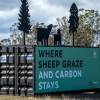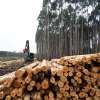
Eight Tasmanian landowners receive funds to integrate trees on farms
Posted 28 April 2022
Planting more trees helps to protect the land for future generations and the Tasmanian Government congratulates eight landowners who will receive grants to integrate 329 hectares of trees on their land.
The Tasmanian Government, with assistance from the Australian Government, has provided $600,000 for the Trees on Farms grants which is managed by Private Forests Tasmania.
The direct value of agroforestry comes from selling wood products, carbon credits, increased farm productivity and co-products such as biofuel, oils and honey.
The indirect benefits of integrating trees on farms include improved biodiversity, providing a habitat for native species, addressing salinity, and enhanced land amenity and value.
In addition to the value of the wood, the successful applicants have identified shelter for livestock, reducing the impact of prevailing winds, improved biodiversity values, carbon sequestration and carbon credits, stabilisation of banks and landslip areas and improving water quality through the reduction of sediment runoff as reasons for integrating trees.
The expansion of Tasmania’s private forests will also help to secure wood for the future with high demand for wood products to continue in future decades.
The plantings will be 78 per cent in woodlots and 22 per cent in shelterbelts. Across the eight sites, 75 per cent will be pinus radiata, 20 per cent eucalyptus nitens, 5 per cent special species and 1 per cent eucalyptus globulus.
The trees will be planted in the winter/spring of 2023.
The successful applicants are:
- St Peters Pass, Oatlands – this farm produces sheep for lamb and wool, cattle, timber plantation and native regrowth.
- Gatehouse, Loongana – Grazing sheep and cattle.
- St Johnstone, Campbell Town – this farm focuses on sheep farming, wool, prime lambs, cereal production, canola and lucerne.
- Keeton Miles, Nietta – this farm focuses on beef and cropping.
- Looseleigh, Selbourne – this farm focuses on cropping and livestock.
- Glenbourne, Blackwood Creek – this farm focuses on livestock and forest production, including fat lambs and cattle breeding.
- Creese North East, Tomahawk – this farm focuses on beef cattle, prime lambs and potatoes.
- Churchill Pastoral Company, Oldina – this farm focuses on beef cattle.
Private Forests Tasmania, which is partially funded by the Tasmanian Government, facilitates the expansion and development of the State’s private resource in a manner that is consistent with sound forest and land management practices.
Media Release, Guy Barnett, Minister for Resources - 28 April 2022.
Share this Article
Latest Articles
-

17 September 2025
Celebrating excellence at the Tasmanian Timber Awards
-

17 September 2025
Forest Practices Authority Research Update Day
-

13 August 2025
Have you seen our Stems for CO2 Project signage on the Midlands Highway?
Archives
- ActivAcre hits milestone, calls for more farmers to get on board
- Napier's leading the way in sustainable forestry and carbon-neutral farming
- Sound science needed to assess carbon impacts of timber harvesting
- Newly appointed TFFPN Board of Directors
- Graduate Certificate of Forestry Scholarship
- Forestry Australia Mentoring Program 2025
- Forest Industry Roundtable planning for the long term
- Eagle Management Constraint Period extended
- Successful private native forest management celebrated
- $15 million investment in new ship loader to boost Bell Bay's forestry exports
- Standing with Tasmania's forestry industry: buy local
- TFPA: Tasmanian Freight Equalisation Scheme needs a ground-up review
- AFCA Gala Dinner celebrates industry excellence
- Fire permits now required Statewide
- Forest leaders hone skills in sustainable native regrowth management
- Tasmanian forests and the carbon market: Barriers and opportunities
- Spring is the time for fuel reduction burning
- Primed for Growth: A situation analysis of the Tasmanian Forest and Wood Products Sector
- Audit requirements cut for low-risk plantation projects
- Guidance and support for landowners after damaging winds
- Forestry Australia welcomes further definition of active forest management
- Farm & Forest Mapper Tool highlighted at Rural Youth Tasmania's Young Farmer of the Year competition
- Senate Select Committee inquiry into the Tasmanian Freight Equalisation Scheme
- Timberlink announces new wood composite products brand
- Newly developed protocol a vital tool for safeguarding forestry industry
- Red Hot Tips: Fire management for Tassie farmers
- Bioenergy: Fuelling industries with trees
- Harvesting trees: What you need to know
- Shelterbelts: How are they contributing to farm systems?
- Infill plantings and remnant vegetation: Why biodiversity depends on a thriving understory
- Plantation planning: The key to a successful plantation
- Exciting interactive forestry knowledge hub launched
- $450,000 farm forestry grant recipients revealed



